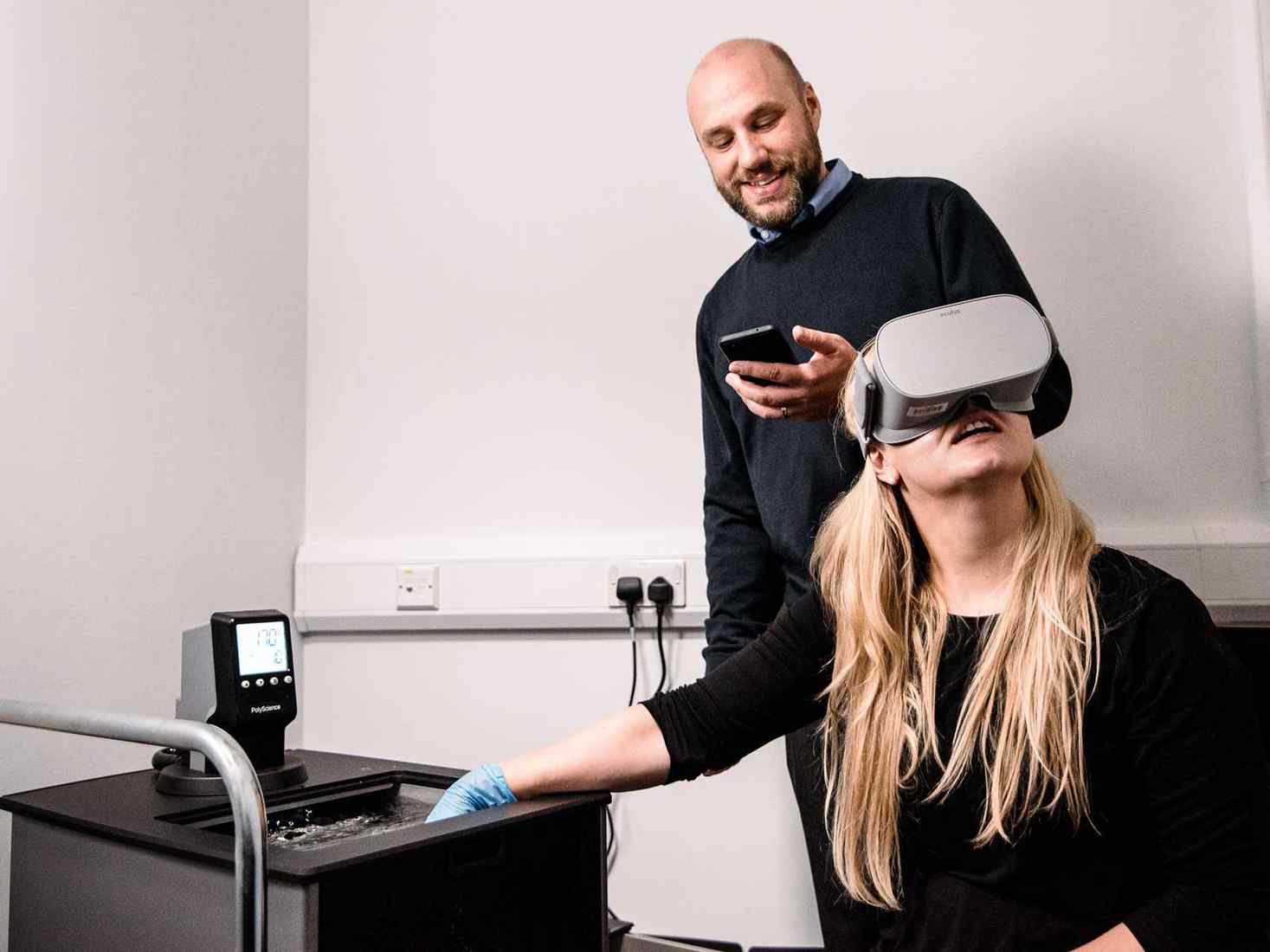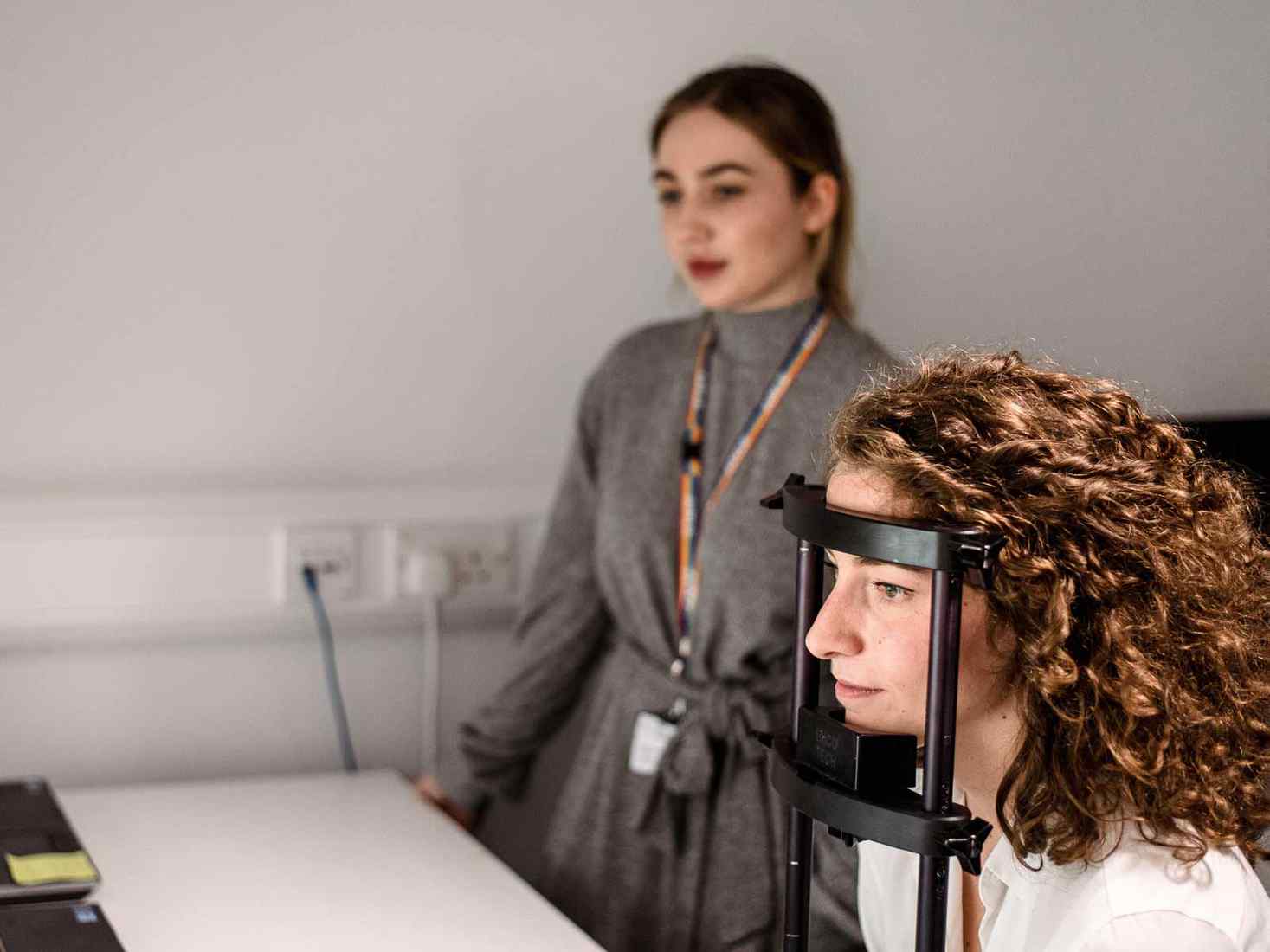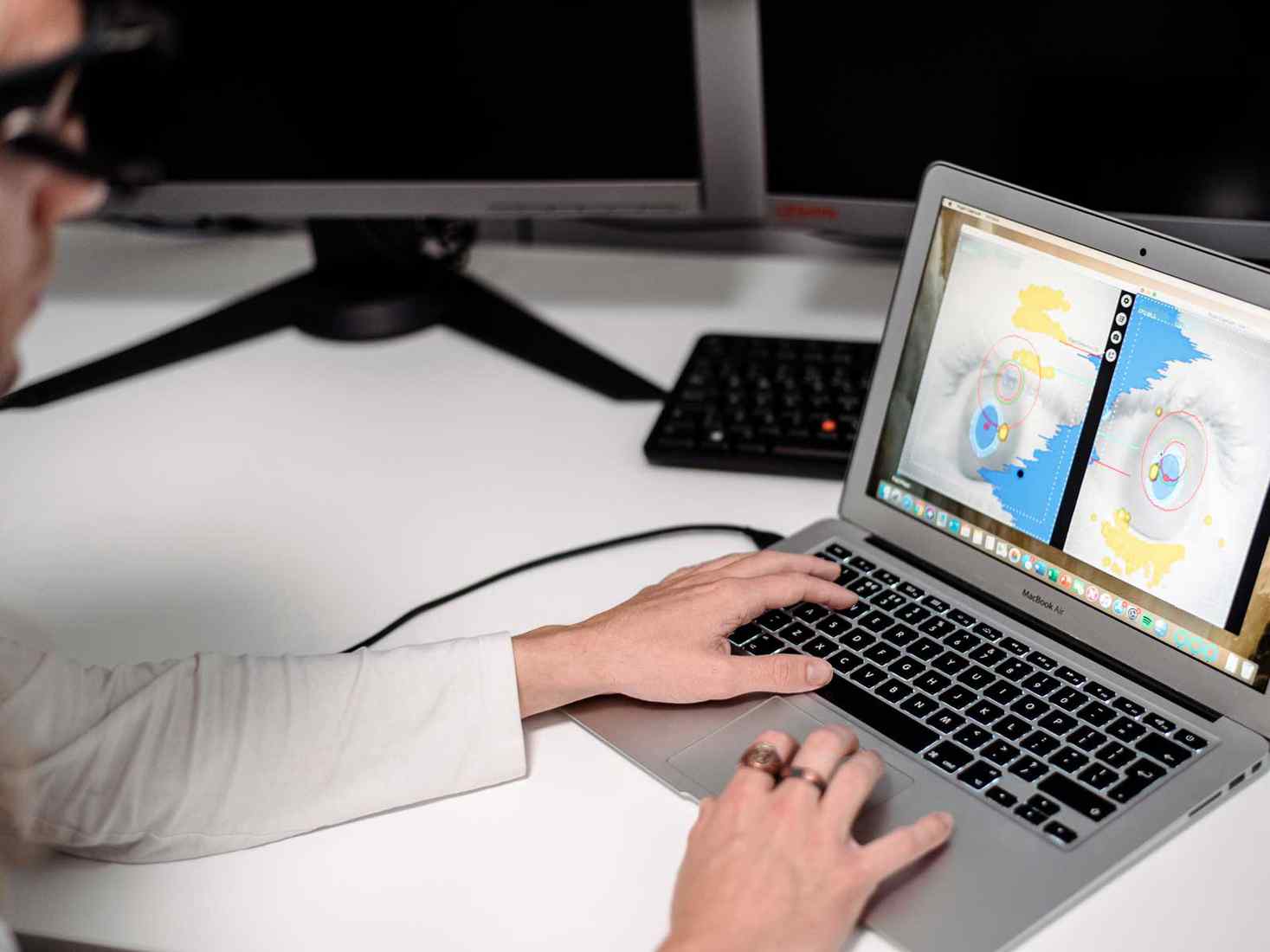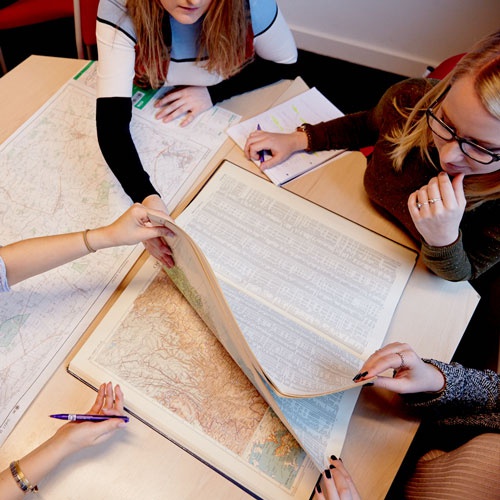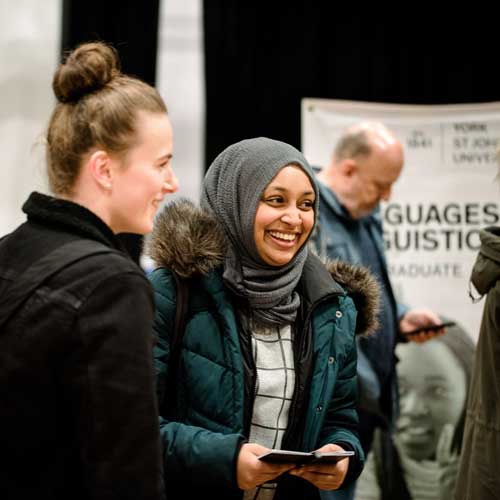Postgraduate Course
Psychology MRes
Prepare for the next steps in your research career with our Psychology MRes.
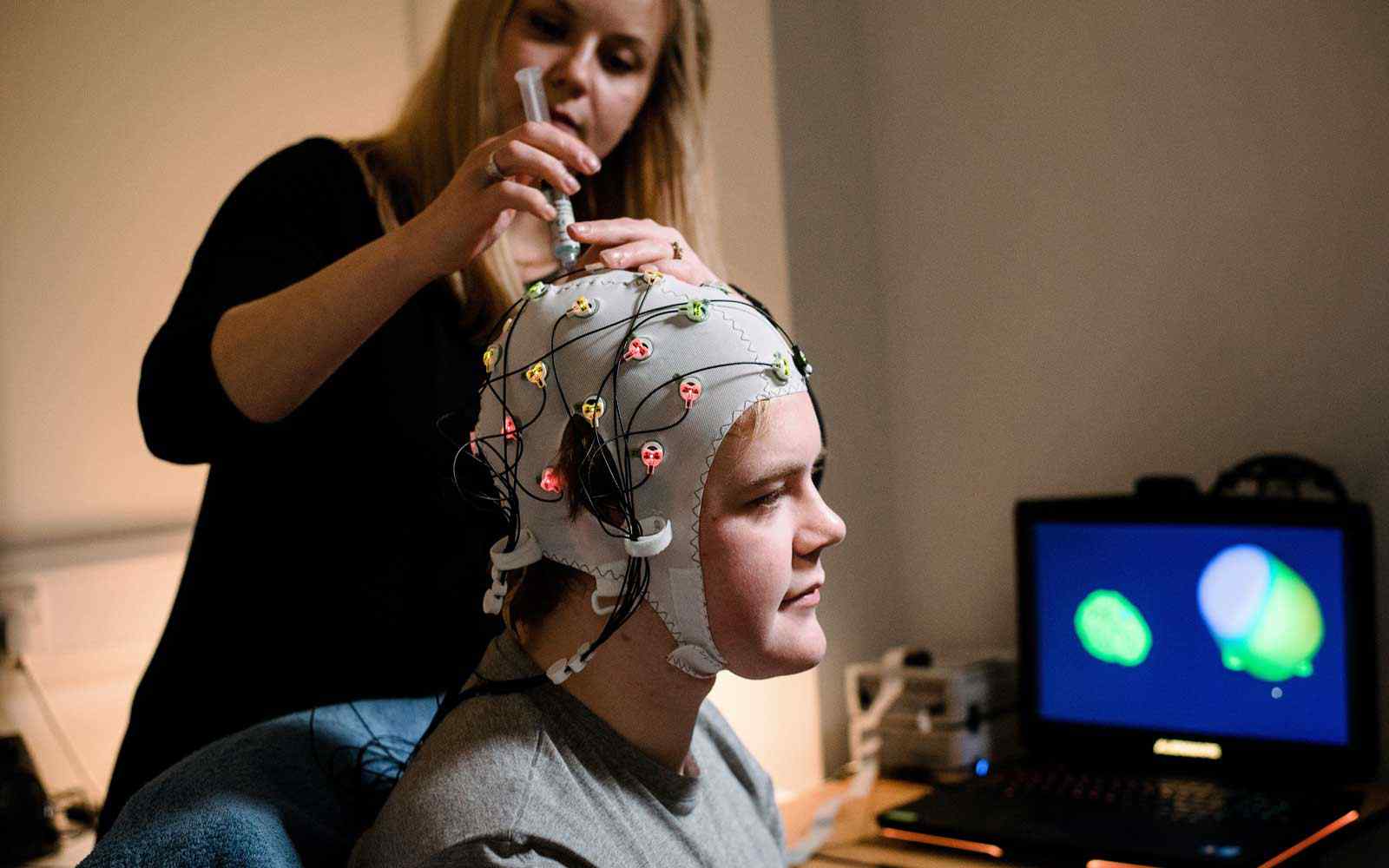
The Psychology MRes is the ideal stepping stone between undergraduate study and your career in research or PhD study. You will undertake high quality research methods training, aligned with the Economic and Social Research Council (ESRC) Postgraduate Training and Development Guidelines. Additionally, you will undertake an extended independent project in an established area of research, supervised by an expert in the field.
York campus
- Duration – 1 year full time, 2 years part time
- Start date – September 2024, September 2025
- School – School of Education, Language and Psychology
Minimum entry requirements
2:1 honours degree in psychology or related subject
Proposal of up to 500 words outlining your research question and methods
Tuition fees
UK 2024-25 £8,000 full time
International 2024-25 £11,300 full time
Course overview
The Psychology MRes allows you to specialise in a specific psychological topic, while also gaining broader research training. You will work as part of a team in an established area of nationally and internationally recognised research excellence.
The course is structured around a year long 60 credit module on psychological research methods, which is benchmarked against the ESRC postgraduate training and development guidelines. Alongside this, you will undertake an extended 120 credit thesis in an area of expertise of one of our members of academic staff.
In addition to gaining an advanced level qualification, you will have the opportunity to develop valuable transferable skills, these include:
- Data collection and analysis
- Research design
- Decision making
- Critical thinking
- Independent learning
- Presentation skills
It is important that you contact a member of our psychology team to discuss your research proposal prior to submitting your application. You will be required to submit an outline research proposal, in line with an advertised project area, in order to be accepted on the course. This will be assessed by a thesis supervisor.
Course structure
How you will study
You can study this postgraduate course full time or part time. This allows you to fit your studies around other commitments.
If you choose to study full time the course will take 1 year to complete. You will study 3 compulsory modules.
If you choose to study part time the course will take 2 years to complete and the modules will be split across both years.
You can find out which modules are available in each semester on the Course Specifications.
Modules
Credits: 60
Compulsory module
This module is designed to align with the Economic and Social Research Council (ESRC) postgraduate training and development guidelines. As such, it will provide you with a solid grounding in quantitative and qualitative methodologies, which will underpin your research activities across the course.
Credits: 120
Compulsory module
On this module you will undertake a year long piece of independent research, with supervision from a specialist member of staff. The thesis enables you to put into practice the skills developed on the Psychological Research Methods module. It requires you to develop and demonstrate a sophisticated understanding of relevant conceptual, methodological and analytical processes. In order to develop key professional skills, you will be required to deliver a presentation, and to write up your study in the style of an extended journal article.
Research areas
For your MRes Thesis, you will need to choose a subject area which interests you. Here is a list of the possible project topics and potential supervisors.
When applying for this course, you will need to complete a research proposal on one of these areas.
Please get in touch with the staff member directly by email to discuss the area you are interested in before applying.
Research projects
Dr Nicola Savill
The contribution of word knowledge to the efficiency of processing words varies between contexts (type of information or language task) and between individuals (with different language or cognitive strengths). My recent research has focused on semantic influences on phonological processing of words in different contexts (reading and verbal short term memory, by manipulating word meaning properties like imageability), in line with interactive-activation based models of language (interactions between semantics and phonology). I’m interested in supervising quantitative projects exploring similar questions and would be happy to hear from potential students with related interests and project ideas.
I would be keen to supervise experimental projects investigating the influence and use of specific meaning-related properties of individual words on the speed/accuracy of processing. Such projects could focus on testing whole group level effects of a particular semantic variable, examine questions related to whether the context is production or recognition, or take an individual differences approach (for example, experimental work examining functional variation in sensitivity to semantic variables; I am). Projects might explore similar questions in relation to developmental dyslexia.
I’m also interested in hearing from students whose project would investigate questions related to the time course of semantic, phonological or other cognitive variables during language tasks, through the use of event-related potentials (ERPs; making use of our EEG facilities). Note that ERP projects are generally demanding, from the conception stage onward, and would require careful development in discussion with me. Of course, continued availability of EEG is subject to circumstances and social distancing guidance with respect to COVID-19.
Dr Paige Davis
Children with Autism have been found to have significantly lower scores on theory of mind (ToM) tasks when compared to typically developing children. They have also been found to have less imaginative play episodes. Recent research has found that although children with Autism show less imagination behaviour, in terms of having an imaginary companion (IC), their ICs are qualitatively similar to children who are typically developing. These data bring up a new research question as typically developing children with ICs have been found to have more developed ToM than those children without ICs. Note, potential students must have access to children with autism in order to do this project.
Dr Nicola Cutting
We all know that children are brilliant at learning to use tools. By copying others, children quickly master how to use a spoon, a cup and even an iPad. In contrast to children’s ability to learn from others, children are surprisingly poor at working things out for themselves. My research investigates the difficulties children have with innovating simple novel tools to solve problems. The evolution of human culture (tools in particular) is due to our faithful imitation of others actions, and innovations. Much research has focused on our ability to replicate what we see, but much less is known about innovations. My research focuses on why innovation is so difficult and what makes someone an innovator. I am interested in supervising projects aligned with the following topics:
- Collaborative Problem Solving – How do people work together to solve problems? Innovations are often the product of people working together. I am interested in whether 2 heads are really better than one or if we are only as good as the best person in the group.
- Scaffolding Problem Solving – Projects on this topic would explore how we can help children to solve problems with the minimum amount of intervention.
- Social Influences on Problem Solving – Projects on this topic would explore the effects of contextual factors on the ability to solve problems (e.g. presence of an unfamiliar experimenter).
Dr Melanie Dawn Douglass
Based on differential obligate parental investment, men and women have different optimum mating strategies. Where gender ratios are skewed, or where access to potential mates is restricted, competition for mating opportunities occurs. Research suggests that this leads to female-female competition in the form of gossip aimed at limiting sexual behaviours of rivals and, where promiscuity is detected, reduced intrasexual cooperation. Specifically, evidence suggests that women spread gossip more frequently than men (Davis, Dufort, Desrochers, & Vaillancourt, 2018), they are more likely to punish women who exhibit sexual-accessibility signals (Muggleton, Tarran, & Fincher, 2019), and such in/direct opposition is more likely in individuals who perceive women as more economically dependent (Price, Pound & Scott, 2014). This relates to my own research and projects I am supervising that focus on the underlying factors that affect (primarily negative) interpersonal interactions (e.g. sexual assault). I have expertise in experimental and survey research methods and would be interested in supervising quantitative projects aligned with the following topics:
- How self-perceived attractiveness and sex ratio affect intrasexual competition.
- How different sexual scripts affect intrasexual cooperation and the tendency to spread gossip about rivals.
- How individual differences (e.g. personality) affect sexual scripts and intrasexual competition.
Dr Lorna Hamilton
Through childhood and adolescence, young people develop an increasingly sophisticated ability to understand, infer and reason about mental states (i.e. the thoughts, beliefs and feelings of themselves and others). This ‘theory of mind’ is central to social functioning and is known to develop differently in young people on the autism spectrum. Recent research has begin to examine how explicit theory of mind might develop through processes of social transmission; for example, children can learn about how people’s mental states relate to behaviour through exposure to stories. Storybooks contain more complex references to mental states than everyday conversation and, in order to understand the behaviour of characters in books, readers have to reason about their thoughts, beliefs and feelings. I am interested in supervising quantitative or mixed methods projects aligned with the following topics:
- Experimental investigations of how book characteristics influence parent-child discussion and/or children’s reasoning about mental states
- Investigation of the relationship between engagement with stories and theory of mind over developmental time
- Exploratory investigation of engagement with narrative media by young people on the autism spectrum.
Dr Matthew Coxon
Clinical trials have demonstrated that immersing individuals in virtual worlds can help manage a wide range of situations where some degree of pain or discomfort is normally experienced (from changing bandages on wounds to pain during childbirth). Since 2017, the literature base has expanded rapidly with beneficial effects of VR distraction being demonstrated across a growing number of labs across the world, with a wide range of clinical populations, and many different forms of pain. However, the theoretical basis of this effect, and the conditions under which it works best, have been relatively neglected within this rapid expansion of the literature. It is generally hypothesised that any effect occurs because virtual reality experiences recruit attentional resources that might otherwise be allocated to other stimuli, although some theorists have more recently argued that the degree of ‘presence’ an individual feels in the virtual world may also be important.
Projects in this area will make use of a cold pressor test (as a source of pain/discomfort), and the latest VR headsets, to further develop our theoretical understanding of how the effect works, and the conditions under which it works best.
Dr Robert Vaughan
An extraordinary physiological capacity combined with personal characteristics and cognitive functioning are crucial for high performance in sports. Despite wide-spread attention there is still much to understand regarding elite performance in sport. My research focuses on three areas of sport and exercise psychology, namely, executive function, personality, and psychometrics. All three intersect across athletic expertise and the individual differences associated with elite athletes. Specifically, I am interested in the mechanics driving athlete expertise and performance. In that, my work looks at a range of factors across different methodologies. For example, my previous research has explored the effect of Dark personality traits (e.g., narcissism, Machiavellianism and psychopathy) on health-related outcomes such as physical activity, whether expert decision-making interacts with emotional competency to predict sport related outcomes such as risk-taking, and whether self-report questionnaires capturing personal dispositions such as mental toughness successfully differentiate individuals across athlete expertise. I am interested in supervising projects in the following areas:
- Psychometric properties of self-report questionnaires and their measurement invariance (e.g., across sample characteristics like athletes vs. non-athletes).
- The role of executive function in predicting performance and/or performance related variables (e.g., penalty kick success under situational pressure).
- The relationship between Dark personalities and sports related variables in athletes (e.g., doping attitudes, burnout and so forth).
Dr Brett Heasman
We all have experienced the sensation of becoming totally absorbed in an activity. Literature on flow states aims to describe this phenomenon by looking at psychological properties related to attention, sense of self, enjoyment, perception of time, motivation, sensory sensitivity and locus of control. Interestingly flow states are linked to wellbeing and high performance, however measuring flow states to understand it further presents a challenge (which is why further research is needed). Flow states are not always easy to predict (for example they might be specific to time and place), people differ in their experience of it (some people are more action-orientated than others) and the act of measuring flow can disrupt it from taking place. I am therefore interested in supervising research that can take either experimental, or more qualitative, approaches to understanding issues such as:
- What is the relationship between flow and other attentional states (for example, mind wandering, dark flow)
- How can we create more enabling environments for flow states?
- How can we more accurately measure flow states?
Dr Jennifer Boland
Mental time travel is a complex cognitive skill, which involves the ability to recollect past experiences (Episodic Memory) and foresee potential novel situations (Episodic Future Thinking). There is a wealth of literature demonstrating how individual differences can impact on the ability to recollect past experiences, and project oneself into the future. I am interested in supervising quantitative projects related to all aspects of memory and future thinking, including:
- The individual differences, such as the impact of depression, dysphoria, and anxiety
- How memory and/or future thinking is impacted within Autism spectrum disorders
- Mental imagery and its impact on cognitive processing
- The application of memory to real world events, for example, eye witness testimony
Dr Melanie Dawn Douglass
There is increasing concern about, and awareness of the prevalence of exposure to graphic materials, including those of a violent nature, from very young ages. Despite this, there has been little research on the type of materials young people are exposed to and the extent to which this exposure affects views of what is (and is not) appropriate behaviour within intimate relationships. Given that governments are developing policies in the face of public pressure, it is important to develop the research base to ensure these policies are evidence-based. I am interested in supervising quantitative projects that build upon the existing evidence to look at how personality factors may correlate with exposure to different types of online images, and how this exposure affects the individual’s behaviour and experiences within intimate relationship. Questions that could be addressed include:
- Whether views about what is appropriate are affected by exposure to different types of graphic materials
- How exposure to graphic materials affects mental health outcomes following experiences of harassment or abuse
- Whether personality factors such as narcissism interact with exposure to graphic materials in determining an individual’s behaviour as a bystander when witnessing inappropriate behaviour
Teaching and assessment
Teaching and learning
You will receive exceptional personal tuition and support. Our small class sizes and interactive teaching methods help to enhance your learning. All tutors offer weekly office hours where you can access personalised support.
You will be allocated an academic tutor in your first week of study. You will be able to develop a supportive relationship with your tutor whilst also working on a set programme of personal, academic and professional development.
Our teaching draws on both our research and professional experience. This means your learning is informed by the most current thinking in the subject area. You can find out more about our research and backgrounds by visiting our staff pages.
Assessment
This course provides a range of assessment types across the modules, including:
- Thesis research report
- Short research skills portfolio
- Exams
- Oral presentations
A significant proportion of your time will be dedicated to the completion of an extended independent research project. This will be supervised by academic staff members, who are nationally and internationally recognised for research excellence.
Developing key research skills will be an important aspect of this experiential learning process. You will go on to produce a thesis in the form of an extended journal article. This will enable you to gain understanding of the academic publication process.
Entry requirements
Qualifications
Minimum entry requirements
2:1 honours degree in psychology or related subject
Proposal of up to 500 words outlining your research question and methods
If your first degree is not in Psychology but you have covered sufficient levels of psychology and research methods, we will consider your application. Applications such as this will be considered on a case-by-case basis.
Research proposal
You will need to submit a piece of writing as part of your application to this course. You will need to write a brief research proposal that should:
- Be up to 500 words
- Identify the research question you would like to examine
- Briefly outline the theoretical background to your proposed research
- Outline the methods you may draw on
This is a non-binding research proposal and changes to your approach and the specifics of your topic will be possible.
You will be required to submit this outline research proposal in line with an advertised project area, and in order to be accepted onto the course this outline application must be acceptable to the proposed thesis supervisor.
International students
If you are an international student you will need to show that your qualifications match our entry requirements.
Information about international qualifications and entry requirements can be found on our International pages.
If English is not your first language you will need to show that you have English Language competence at IELTS level 6.0 (with no skill below 5.5) or equivalent.
International entry requirements
Terms and conditions
Our terms and conditions, policies and procedures contain important information about studying at York St John University. You can read them on our Admissions page.
Fees and funding
UK 2024 - 2025 entry
The tuition fee for 2024 entry to the Psychology MRes is:
- £8,000 for full time study
- £4,000 per year for part time study
These costs apply to all UK, Jersey, Guernsey and Isle of Man students.
Postgraduate loans are available to help you pay for your master’s course. Find out more about funding your postgraduate studies.
International 2024 - 2025 entry
The tuition fee for 2024 entry to the Psychology MRes is:
- £11,300 for full time study
- £5,650 per year for part time study
These costs apply to all students living outside the UK.
Due to immigration laws, if you are an international student on a student visa, you must study full time. For more information about visa requirements and short-term study visas, please visit the International Visa and Immigration pages.
Find out more about funding your postgraduate studies.
Tuition fees
UK 2024-25 £8,000 full time
International 2024-25 £11,300 full time
Alumni Scholarships
If you are alumni of York St John University we have scholarships available to help you continue your studies.
Additional costs and financial support
Course-related costs
While studying for your degree, there may be additional costs related to your course. This may include purchasing personal equipment and stationery, books and optional field trips.
Accommodation and living costs
View our accommodation pages for detailed information on accommodation and living costs.
Career outcomes
Where could Psychology MRes take you?
This course will prepare you for PhD study and a career in research, You will also develop transferrable skills including:
- Problem solving
- Developing arguments
- Analysing and evaluating information
- Collaboration
- Independent working
- Communication
Stand out from the crowd with postgraduate study.
Far fewer people have postgraduate degrees than undergraduate qualifications. This gives you something extra to set yourself apart in a competitive graduate job market. Those with a postgraduate qualification will earn an average of £7,000 a year more than those with only an undergraduate degree. (Department For Education Graduate Labour Market Report 2020)
Our careers service, LaunchPad, provides career support tailored to your ambitions. Through this service you can access:
- Employer events
- LinkedIn, CV and cover letter sessions
- Workshops on application writing and interview skills
- Work experience and volunteering opportunities
- Personalised career advice
This support does not end when you graduate. You can access our expert career advice for the rest of your life. We will help you gain the experience and confidence you need to succeed.
Course highlights
Impressive psychology laboratories
Our laboratories include eye-tracking equipment, surveillance rooms, virtual reality headsets and motion sensors, plus Biopac physiological recording equipment.
A wealth of research projects
Research projects recently carried out by our experts include 'Body Image and Mental Health in the Digital Age' and 'Pain Management and Virtual Reality'.
Economic and Social Research Council (ESRC)
Undertake high quality research methods training, aligned with the Economic and Social Research Council (ESRC) Postgraduate Training and Development Guidelines.
Read our blog
When you join this course you will be part of the School of Education, Language and Psychology. Meet the team and read about the latest news and student achievements on our school blog.

Maddi Psychology MRes
I never planned on doing a Master’s after finishing my undergraduate degree, but having completed my dissertation last year at York St John I realised I really enjoyed the whole process of conducting research. The MRes provides you with the freedom to undertake your own research project with guidance and support from your supervisor.
